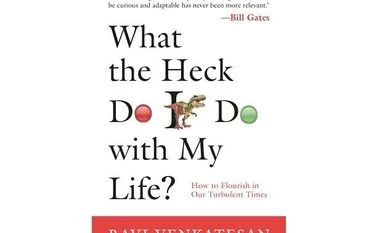What the Heck do I do with My Life? How to Flourish in our turbulent times
Author: Ravi Venkatesan
Publisher: Rupa
Pages: 208
Price: Rs 395
Here is one reason this book struck a chord with me instantly. When I was growing up, my goals in life were clear: Choose the path to a professional life such as a doctor or an engineer or an architect or lawyer or an IAS officer or a military officer or a journalist; study hard and get good marks; the high water mark of life was when you made it to undergrad college on merit and then to an Indian Institute of Management or an Indian Institute of Technology (IIT) or a law college or a journalism school. Once done, continue working hard in your life as a doctor or an engineer or a lawyer or a public servant or a journalist, raise a family and live a contented life. This was the ambition for most of my family, too.
The author of the book, Ravi Venkatesan, asserts that he and his parents, like me and my parents and many middle-class Indians of our and our parents’ generations, found it easy to accept and abide by these dicta. But he asks: Could such an approach be true any longer in the fast-changing world into which we are sliding —the world of Artificial Intelligence (AI), of complexity, uncertainty and change?
He describes some of the features of this new world. Two thirds or more of the wealth being generated in India (or the world for that matter) goes to a small group of people (less than a tenth of the population), he writes. Our world is one of astonishing disruption as well — Covid-19, for example — making everyone forget what an office looks like. It’s a world where we tend to live so long that we often worry whether our hard-earned savings will see us to the end. It’s a world, where in every country, one section of people is battling some other section on the basis of race, religion, or caste or even imagined differences.
The author has many suggestions on how best to take on and succeed in this emerging, bewildering world. Some of the easier ones are to: (a) learn new types of skills (he calls them “meta-skills”), (b) stop being passive and adopt an entrepreneurial mindset and (c) embrace soft skills such as being empathetic and supportive of fellow-workers, communicating and listening well. Clearly, if you have to prepare yourself for this new world, the college degree you have acquired, says the author, is not enough by itself. You need to reflect on the new things that you are ready to try to get yourself ready. For instance, will you take a course in a new subject? If so, what course will it be? If you will learn a new skill, what skill will that be? If you will take on a new professional challenge, what will that be? If you will do voluntary work with some organisation, which one will it be?
Such questions to reflect on, as a matter of fact, awaits the reader at the end of every chapter and greatly help in converting the usual abstract arguments we find in such self-help books into readily understandable dimensions of your own life.
The author says that leadership “is the central issue of our time”. He believes such leadership skills are missing at all levels in India and hypothesises that this could be because “we have been conditioned from childhood to wait for someone with authority and a formal mandate to fix things and rescue us”. He illustrates this position with examples from many different walks of life. He also has examples from his own life, when he became CEO of Microsoft in India. From his experiences he has developed a how-to list of skills that a leader has to acquire, and he describes these in this book.
He draws a parallel between life and the game of snakes-and-ladders, and quotes Salman Rushdie from Midnight’s Children that for “…every ladder you climb, a snake is waiting around the corner…”. Some of the “snakes” he describes and illustrates with frightening examples of fallen leaders is the temptation to make money illegally, choosing to listen to the wrong people and making wrong ethical choices. He has advice on how to “ward off” such snakes and this includes not hanging out with some types of people and being careful about where you get your information from.
Most self-help books are written by foreign (usually American) authors and their analyses of what counts for success and what achievement means have always had an unreal feel for me. I guess the reason this book resonates for me is that the author is from an Indian middle-class family and has wended his way through IIT Bombay and Harvard Business School and spent most of his work-life in India, as Chairman of Microsoft India, among other positions. So, the examples feel real.
ajitb@rediffmail.com. The reviewer is an internet entrepreneur
Unlock 30+ premium stories daily hand-picked by our editors, across devices on browser and app.
Pick your 5 favourite companies, get a daily email with all news updates on them.
Full access to our intuitive epaper - clip, save, share articles from any device; newspaper archives from 2006.
Preferential invites to Business Standard events.
Curated newsletters on markets, personal finance, policy & politics, start-ups, technology, and more.
)